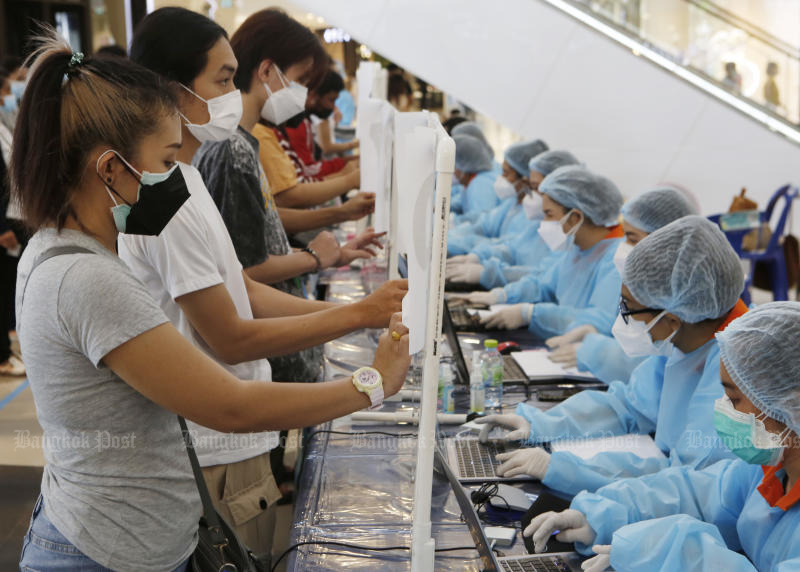
Authorities have claimed Thailand is halfway to reaching Covid-19 herd immunity, six months after the first group of people were inoculated.
According to Public Health Ministry figures on Sunday, 25.2 million people have received the first jab, 10 million have got the second shot and 604,023 have had the booster dose.
Taweesilp Visanuyothin, spokesman of the Centre for Covid-19 Situation Administration, on Monday welcomed the 25-million milestone, saying 25 million more would be vaccinated to achieve the goal. "We have already reached halfway," he said.
The government targeted 50 million of 70 million people, or 70% of total population, to receive the first shot to create herd immunity.
Thailand's first inoculation of the vaccine started on Feb 28 and Prime Minister Prayut Chan-o-cha made it national agenda on June 7.
The daily vaccination rate nationwide has gained pace over the past few weeks, peaking at more than 920,000 shots on Friday, as more vacines were available.
Herd immunity implications
Gen Prayut announced on June 16 to reopen the country in 120 days, or by Oct 14, but did not make herd immunity a condition. He only called on all Thais to receive vaccines.
Still, herd immunity was used as a benchmark for Phuket to reopen the island to fully vaccinated tourists from July 1. Vaccines were sent to the resort island for 70% of its population in time for the reopening. The Phuket model has since been used for the reopening of Koh Samui and its neighbouring islands, as well as some Andaman resort provinces.
Tourism and Sports Minister Phiphat Ratchakitprakarn said last week that his ministry planned to fully open the country by January on the condition that herd immunity was reached.
Dr Taweesilp said on Monday the vaccination drive would continue, especially on an estimated 500,000 pregnant women, only 9% of whom received first jabs.
Thailand has seen a decline in the number of new infections as more people were jabbed and hard-hit places were under lockdown.
But Dr Taweesilp warned of a new infection surge if measures against the coronavirus were ignored.
On a global scale, however, it remains unclear how Covid-19 herd immunity is calculated. The World Health Organization said late last year it was too early to tell.
"We are still learning about immunity to Covid-19. Most people who are infected with Covid-19 develop an immune response within the first few weeks, but we don’t know how strong or lasting that immune response is, or how it differs for different people. There have also been reports of people infected with Covid-19 for a second time," read the statement.
"Until we better understand Covid-19 immunity, it will not be possible to know how much of a population is immune and how long that immunity last for, let alone make future predictions. These challenges should preclude any plans that try to increase immunity within a population by allowing people to get infected."
Israel, one of the countries with the highest vaccine roll-outs, lifted restrictions in April this year. One of its doctors had said he believed the country was close to reaching herd immunity. At the time, 68% of the population had been vaccinated or tested positive in the past.
But after Delta hit the country in June, Israel went from single-digit daily infections and zero deaths to around 7,500 daily cases late last month. On July 30, it began administering a third dose of the Pfizer vaccine to people over 60, the first country to do so.
